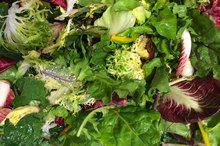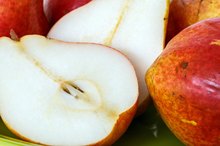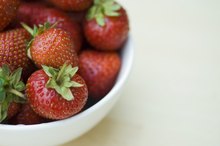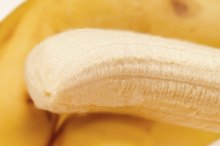There are two types of red cherries, the larger, slightly darker-colored red cherry, which is sweeter and commonly eaten raw, and the sour cherry, which is a little lighter colored but still red 1. Both sweet and sour cherries are rich in potassium, although one serving does not provide you with all the potassium you require 1.
Potassium in Sweet and Sour Cherries
A 1-cup serving of pitted sour cherries has 268 milligrams of potassium. In turn, a 1-cup serving of pitted sweet cherries has 342 milligrams of potassium per serving.
Function of Potassium
Foods With Potassium Bicarbonate
Learn More
Potassium is an essential mineral in your body, helping with the breakdown of carbohydrates, the building of proteins and muscles, and maintaining overall healthy body development. As an electrolyte, potassium controls your heart's electrical activity, and it helps maintain your body’s acid-base balance. The recommended dietary intake of potassium is 4,700 milligrams for adult men and women, rising to 5,100 milligrams for women who are nursing or pregnant.
Insufficient Amounts of Potassium
Do not rely on sweet or sour cherries to help you meet your daily potassium requirement 1. If you don't consume enough potassium, you can develop hypokalemia, or low potassium levels in your body. Hypokalemia can lead to a weakened state, abnormal heart palpitations and an increase in your blood pressure. Low potassium levels can also be the result of kidney or adrenal gland complications.
- Do not rely on sweet or sour cherries to help you meet your daily potassium requirement 1.
- Hypokalemia can lead to a weakened state, abnormal heart palpitations and an increase in your blood pressure.
Other Sources of Potassium
Eating Too Much Potassium
Learn More
Potassium is abundant in a range of foods, including other fruits, such as:
- citrus fruits
- kiwis
- prunes
- cataloupe
- bananas
Apricots are also a good source of potassium, although dried apricots contain more potassium than fresh ones. All meats and poultry have a lot of potassium per serving, as do fish such as salmon, sardines and cod. Soy protein products are also a good source of potassium. Eat a range of foods -- fruit, vegetables and proteins -- to meet your daily potassium requirements.
- Potassium is abundant in a range of foods, including other fruits, such as: * citrus fruits
* kiwis
* prunes
* cataloupe
* bananas Apricots are also a good source of potassium, although dried apricots contain more potassium than fresh ones.
Related Articles
References
- Saveur.com: Sweet and Sour Cherries
- USDA National Nutrient Database: Cherries, Sour, Red, Raw
- USDA National Nutrient Database: Cherries, Sweet, Raw
- University of Maryland Medical Center: Potassium in Diet
- Potassium. Office of Dietary Supplements. National Institutes of Health
- Lambert H, Frassetto L, Moore JB, et al. The effect of supplementation with alkaline potassium salts on bone metabolism: a meta-analysis. Osteoporos Int. 2015;26(4):1311-8. doi:+10.1007/s00198-014-3006-9
- Chatterjee R, Slentz C, Davenport CA, et al. Effects of potassium supplements on glucose metabolism in African Americans with prediabetes: a pilot trial. Am J Clin Nutr. 2017;106(6):1431-1438. doi:10.3945/ajcn.117.161570
- Potassium. Fact Sheet for Consumers. Office of Dietary Supplements. National Institutes of Health
- Health Claim Notification for Potassium Containing Foods. US Food and Drug Administration
- Aburto NJ, Hanson S, Gutierrez H, Hooper L, Elliott P, Cappuccio FP. Effect of increased potassium intake on cardiovascular risk factors and disease: systematic review and meta-analyses. BMJ 2013;346:f1378.
- Academy of Nutrition and Dietetics. What Is Potassium?
- ConsumerLab.com. Potassium Supplements Review.
- Curhan GC, Willett WC, Rimm EB, Stampfer MJ. A prospective study of dietary calcium and other nutrients and the risk of symptomatic kidney stones. N Engl J Med 1993;328:833-8.
- Curhan GC, Willett WC, Speizer FE, Spiegelman D, Stampfer MJ. Comparison of dietary calcium with supplemental calcium and other nutrients as factors affecting the risk for kidney stones in women. Ann Intern Med 1997;126:497-504.
- D’Elia L, Barba G, Cappuccio FP, Strazzullo P. Potassium intake, stroke, and cardiovascular disease a meta-analysis of prospective studies. J Am Coll Cardiol 2011;57:1210-9.
- O’Neil C, Keast D, Fulgoni V, and Nicklas T. Food sources of energy and nutrients among adults in the US: NHANES 2003-2006. Nutrients. 2012;4:2097-120. DOI: 10.3390/nu4122097.
- Stone M, Martyn L, and Weaver C. Potassium intake, bioavailability, hypertension, and glucose control. Nutrients. 2016;8: E444. DOI: 10.3390/nu8070444.
- U.S. Food and Drug Administration. Health Claim Notification for Potassium Containing Foods.
- Weaver CM. Potassium and health. Adv Nutr 2013;4:368S-77S.
- Yong Sun, et al. Dietary potassium regulates vascular calcification and arterial stiffness. JCI Insight. 2017;2(19):e94920.
Writer Bio
Marie Dannie has been a professional journalist since 1991, specializing in nutrition and health topics. She has written for "Woman’s Own," the "Daily Mail," the "Daily Mirror" and the "Telegraph." She is a registered nutritionist and holds a Bachelor of Science degree with honors in food science from the University of Nottingham.









